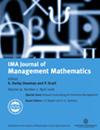Staying Positive: Challenges and Solutions in Using Pure Multiplicative ETS Models
IF 4.3
3区 工程技术
Q3 MANAGEMENT
引用次数: 0
Abstract
Exponential smoothing in state space form (ETS) is a popular forecasting technique, widely used in research and practice. While the additive error ETS models have been well studied, the multiplicative error ones have received much less attention in forecasting literature. Still, these models can be useful in cases, when one deals with positive data, because they are supposed to work in such situations. Unfortunately, the classical assumption of normality for the error term might break this property and lead to non-positive forecasts on positive data. In order to address this issue we propose using Log-Normal, Gamma and Inverse Gaussian distributions, which are defined for positive values only. We demonstrate what happens with ETS(M,*,*) models in this case, discuss conditional moments of ETS with these distribution and show that they are more natural for the models than the Normal one. We conduct the simulation experiments in order to study the bias introduced by point forecasts in these models and then compare the models with different distributions. We finish the paper with an example of application, showing how pure multiplicative ETS with a positive distribution works.保持积极态度:使用纯乘法 ETS 模型的挑战和解决方案
状态空间形式的指数平滑法(ETS)是一种流行的预测技术,被广泛应用于研究和实践中。虽然加法误差 ETS 模型已经得到了很好的研究,但乘法误差模型在预测文献中受到的关注要少得多。不过,这些模型在处理正数据时还是很有用的,因为它们应该在这种情况下起作用。遗憾的是,误差项的经典正态性假设可能会打破这一特性,导致对正数据的非正向预测。为了解决这个问题,我们建议使用对数正态分布、伽马分布和反高斯分布,这些分布只针对正值。我们演示了 ETS(M,*,*)模型在这种情况下的情况,讨论了使用这些分布的 ETS 条件矩,并证明它们比正态分布更适合这些模型。我们进行了模拟实验,以研究这些模型中点预测带来的偏差,然后比较了不同分布的模型。最后,我们以一个应用实例来说明正态分布的纯乘法 ETS 是如何工作的。
本文章由计算机程序翻译,如有差异,请以英文原文为准。
求助全文
约1分钟内获得全文
求助全文
来源期刊

IMA Journal of Management Mathematics
OPERATIONS RESEARCH & MANAGEMENT SCIENCE-MATHEMATICS, INTERDISCIPLINARY APPLICATIONS
CiteScore
4.70
自引率
17.60%
发文量
15
审稿时长
>12 weeks
期刊介绍:
The mission of this quarterly journal is to publish mathematical research of the highest quality, impact and relevance that can be directly utilised or have demonstrable potential to be employed by managers in profit, not-for-profit, third party and governmental/public organisations to improve their practices. Thus the research must be quantitative and of the highest quality if it is to be published in the journal. Furthermore, the outcome of the research must be ultimately useful for managers. The journal also publishes novel meta-analyses of the literature, reviews of the "state-of-the art" in a manner that provides new insight, and genuine applications of mathematics to real-world problems in the form of case studies. The journal welcomes papers dealing with topics in Operational Research and Management Science, Operations Management, Decision Sciences, Transportation Science, Marketing Science, Analytics, and Financial and Risk Modelling.
 求助内容:
求助内容: 应助结果提醒方式:
应助结果提醒方式:


